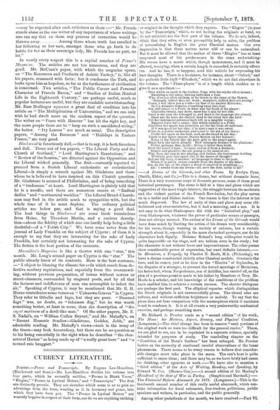CURRENT LITERATURE.
POETRY.—Poems and Transcripts. By Eugene Lee-Hamilton. (Blackwood and Sons.)—Mr. Lee-Hamilton divides his volume into four parts, which he severally entitles, "Poems in Blank Verse," "Elegies," "Poems in Lyrical Metres," and "Transcripts." The first are distinctly prosaic. They are sketches which seem to us to gain no advantage from the form, wanting as it in harmony and grace, into which they have been put. The "Poems in Lyrical Metres" are scarcely happier in respect of their form, nor do we see anything striking
or original in the thought which they express. The "Elegies " (to pass by the " Transcripts," which, as not having the originals at hand, we do not criticise) are the best part of the volume. We do not, indeed, think that they solve, or even perceptibly help to solve, the problem of naturalising in English the great Classical metres. Our own impression is that these metres never will or can be naturalised. But it must be allowed that the author of these "Elegies " has at least surpassed most of his predecessors in the same undertaking. His verses have a music which, though monotonous, and it must be allowed, wearying, when a certain length is exceeded, is certainly effect- ive. And he has, it so happens, used this vehicle for expressing his best thoughts. There is a freshness, for instance, about "Oxford," and the pathetic little idyll "Elizabeth," which we do not find elsewhere in the volume. The " Flute-player" is of a length which enables us to give it as a specimen :—
"That which on earth is the frailest, Time with his scythe often misses ; Sweeping a city away, leaving unbroken a vase.
Who does not often exclaim, as he treads in the steps of the Mower,
Strength, indeed thou art weak ; weakness, indeed thou art strong r Come. I will show you a tomb—'tis that of an ancient Etruscan ;
In it a woman's remains, crumbling away into dust.
See, still intact, is a Flute, in what was the hand of the player ; Centuries twenty, nay more, mute has it lain by her side.
Dead is the race she belonged to, and dead is the language she uttered, Dead are the laws she obeyed, dead is the creed that she held ; Yet her ephemeral presence bath left us a tangible vestige; Empires leave but a name ; that which endures is a Flute. Doubtless her music was primitive, yet for the Gods all-sufficient, If it was good for her time, if in men's ears it was sweet. Flute, be a potent enchanter, and come to the aid of my fancy; Clothe her again in the flesh, such as she stood in her day ; Youth to her figure restore, Beauty bestow on her features; Some of the breath that she gave, give to the player again.
Shape bath she taken already. How strangely distinct is the phantom Fairer, perhaps, than in life ; fiction is fairer than truth. Even the music I hear ; 'tis faint, and as if from a distance; Simple and plaintive the air, young is the musical art. Why does she stop in her playing, and listless, the instrument holding, Wistfully gaze into space, lost in the mazes of thought? Tell me thy story, 0 maiden : all language is clear to the poet, When it in purity comes straight from the depths of the heart
See, on the lips of the player a word of emotion is trembling Ah I I awake from my dream—all, save the flute, melts to air " —A Dream of the Gironde, and other Poems. By Evelyn Pyne. (Smith, Elder, and Co.)—This is a drama, but without dramatic force. There is a very numerous corps of dramatis persome, some of them great historical personages. The scene is laid at a time and place which are suggestive of the most tragic interest, the struggle between the moderate and the violent parties of the French Revolution, but the play moves on in a feeble and lifeless fashion. One reason is that the interest is too much dispersed. The law of unity of time and place may seem old- fashioned and over-restrictive, but it had a meaning, and a use. It is not easy to do what Shakespeare did with the "historical play," and even Shakespeare, whatever the power of particular scenes or passages, does not always succeed. The author of the Dream of the Gironde would have done much by limiting the action of his drama very considerably, for his verse, though wanting in variety of cadence, has a certain strength about it, especially in the more rhetorical passages, nor do his characters lack dignity. Madame Roland's long soliloquies would be quite impossible on the stage, and are tedious even in the study ; but the character is not without force and impressiveness. The otherpoems show considerable power of expression, but want definite interest.— In Hermione, a Tragedy, by Charles N. bole, M.A. (Pickering), we have a drama constructed strictly after Classical models. Orestes is the hero, and he comes, jest as he does in the "Electra" of Sophocles, in the disguise of a stranger, to prevent the forced marriage of Hermione, his betrothed, whom Neoptolemus, son of Achilles, has carried off,on the plea of a previous promise made to his father by Menelaus at Troy. Mr. thole is a scholar, and his knowledge of the conditions of the problem have enabled him to achieve a certain success. The shorter dialogues are perhaps the best part. The elliptical repartee which distinguishes the Greek originals is not unsuccessfully given. The choral odes are tedious, and without sufficient brightness or melody. To say that the piece does not bear comparison with the masterpieces which it emulates is not to condemn it. It is at all events a very praiseworthy academical exercise, and perhaps something more.






























 Previous page
Previous page